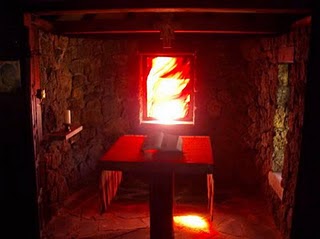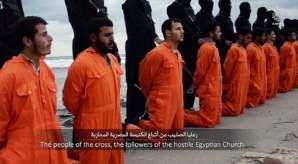
When I read the warning in Friday's Gospel, "Unless your righteous-ness sur-passes that of the Pharisees, you will not enter the Kingdom of heaven," I was reminded of a question I was once asked by a hermit candidate. I think I have related it here before. He wondered how it was I balanced the "hermit things I do and the worldly things I do"? When I asked what he meant by worldly things he began to explain and listed things like laundry, cleaning the bathroom, washing dishes, etc. When asked what he meant by hermit things he explained he meant prayer, lectio, Mass, fasting, and all of the other "spiritual" things which were or were becoming a part of his faith life. In response I tried to explain that at some point --- once he was truly a hermit in the sense he needed to be, especially in order to be professed under c 603, he would come to see that all of the everyday things he did became "hermit things" because after all, he would be a hermit with the heart of a hermit and these were the things done by him. One could not divide one's life into spiritual things and worldly things in such an arbitrary way. The aim of his life with and in God was to allow all things to breathe with the presence of God --- and as a hermit, to witness to the fact that this occurs in the silence of solitude.
There was a corollary. What was also true was that it was possible for him to do all the things a hermit does every day and never become or be a hermit. Unless his "hermitness" came from within and defined everything he did he would remain a person living alone and doing things many many people of many different vocations would do every single day. What had to change was his heart. At some point, if he was truly called to eremitical life, he would develop the heart of a hermit, that is, the heart of a disciple of Christ shaped and nurtured through the events and circumstances of his life as these are transfigured by his dialogue with God in solitude and silence. Righteousness is a matter of the heart existing in an empowered and transfiguring relationship with God and then with others. Merely observing laws may not imply the profound dialogue with God which constitutes real righteousness.
Rule of Life and the Personal Call of God:
A second story might also help explain what concerned Jesus in Friday's Matthean lection. When seeking admission to profession and consecration under canon 603 I, like all diocesan hermits, was required to write a Rule or Plan of Life. There were many possibilities for constructing such a Rule but there were two main options: 1) create a Rule which was essentially a list of things I was to do or avoid doing each day. Such a Rule would include rules for hospitality, allowances for limited active ministry, forms of prayer and devotions to be done, allowed frequency and circumstances associated with leaving the hermitage, daily schedule (rising, recreation, hours of prayer, rest, meals, study, work, retiring, etc, etc.), use of media, times for retreat, spiritual direction, contact with friends and family, the role of the Bishop and delegate, vows, etc. Over all it would be a list of do's and don'ts which constituted laws.
I realized this wouldn't work for me for a couple of reasons. First I would be setting myself up for failure. Sometimes this failure would be due to my own weakness, not only my own resistance but illness, lack of stamina, etc. Secondly though, I knew that such a Rule would not have the ability to inspire me or empower faithfulness and growth. In the short term or over the long haul such a Rule would not serve me or my vocation well. It simply would not speak to my heart or reflect the redemptive way God worked in my life. It would be about external things, important things, yes, but still only external matters. While I had to include such matters, the Rule needed to allow God to continue working within me and therefore, to create the opportunities I personally needed in order to hearken more and more fully to God's call. It needed to allow for a greater righteousness than mere codified law could ever do. In other words, it needed to reflect and express the ways God makes me truly myself. It needed, so to speak, to be stamped with my Name on every page and too, to call me by Name to be every day of my life.
Surpassing Righteousness: Living the Law of our Hearts

Just as my Rule expresses God's personal call to me, so it expresses my truest self, and therefore, the "law written on my heart." That law, that identity or truest self is symbolized by my name. In true prayer we call upon God by name ("Abba!") as the Spirit empowers us; we give God a sovereign place to stand in our lives and world. But at the same time God calls us by name and gives us a place to stand in his own life. This is the essence of the dialogue of love that occurs between us, the way in which we are made true and empowered by God to a surpassing righteousness. Similarly, it empowers us to call others by name to be, to give the incredible mystery each person is and is called to be a place to stand in our own world without violating or judging them.
To learn to call others by name in this way is to act towards them with the same love God shows us. It was striking to me last week as I reflected on Friday's Gospel that all of this stood in direct counterpoint and contrast to a law which judges and fails to respect the mystery, the sacred and sacramental wholeness of our selves. It is this more external and lesser law which allows us to call another "Raqa" or to judge them to be a fool. It is the same imperfect and partial law which divides and allows us to accept the division of reality into spiritual and worldly things or which remains merely external to ourselves. Moreover, it is the law which drives so much of the world around us which is geared to success and competition at others' expense or to label some "neighbors" and others "aliens" and even to deprive them of names and supplant these with clinical designations or even with numbers.
 |
| Artist, Mary Southard, CSJ |
Theologians like Gerhard Ebeling have noted that it is "addressibility," our divinely rooted capacity for receiving and extending personal address which is both the essence of love and, at the same time, the really unique and most human thing about us. Betrayal of this capacity is the deepest and perhaps the most dehumanizing sin we know. To name and to call upon another by name are two of the most profoundly creative acts we undertake by means of language because these allow another to genuinely exist as a person rather than as an anonymous "other" with no real place to stand in our lives or the world of human community.
I have begun thinking of "addressibility" as one central meaning of the notion that we are created in the image of God (imago Dei) and thus too, the law which God carves on our hearts; it is the "law," this "image," which Lent seeks to allow us to live more fully. Whether we do that through prayer where we call upon God and allow God to call us by name, through penance where we learn to hear our own deepest names and become aware of our common humanity with others, or through a true almsgiving where we do not merely give things to others but rather gift them in ways which summon them to their truest dignity, where, that is, we give in ways which call others by name to be, addressibility is the gift and law we embody most profoundly; it is the surpassing righteousness to which we are called. Billy, an 8 year old described it this way, [[You know you are loved by the way someone holds your name in their mouth.]]
My prayer is that we each take seriously our call to the surpassing righteousness which allows us to call upon God as "Abba" and simultaneously lets him call us by name to be. May we allow God to remake our hearts in terms of the law written there and symbolized by our truest Name; may we be similarly inspired to "hold one another's names in our own mouths" with the genuine reverence God teaches us by the way he loves and addresses us.
 [[Hi Sister, could you say a little more about what you call "addressibility" and the way that refers to what it means to be made in the image of God? I have never heard this before and don't know how to think about it. I don't know who Gerhard Ebeling is. Thank you!]]
[[Hi Sister, could you say a little more about what you call "addressibility" and the way that refers to what it means to be made in the image of God? I have never heard this before and don't know how to think about it. I don't know who Gerhard Ebeling is. Thank you!]] Again, name symbolizes the WHOLE person who is always more than the sum of her parts and invites her to be her truest self. When God calls us by name to be it is a creative act. It recognizes and even mobilizes the entire mystery of the person in a way no other word does. When we act similarly it is similarly creative; it gives others a place to stand in community with us which the person cannot create herself. Again, to call another by name is to constitute them in freedom not least because it extends membership in a human community to them, a necessary condition of possibility of human growth and fulfillment. It is an act of profound compassion, perhaps the highest we can exercise.
Again, name symbolizes the WHOLE person who is always more than the sum of her parts and invites her to be her truest self. When God calls us by name to be it is a creative act. It recognizes and even mobilizes the entire mystery of the person in a way no other word does. When we act similarly it is similarly creative; it gives others a place to stand in community with us which the person cannot create herself. Again, to call another by name is to constitute them in freedom not least because it extends membership in a human community to them, a necessary condition of possibility of human growth and fulfillment. It is an act of profound compassion, perhaps the highest we can exercise.


































































